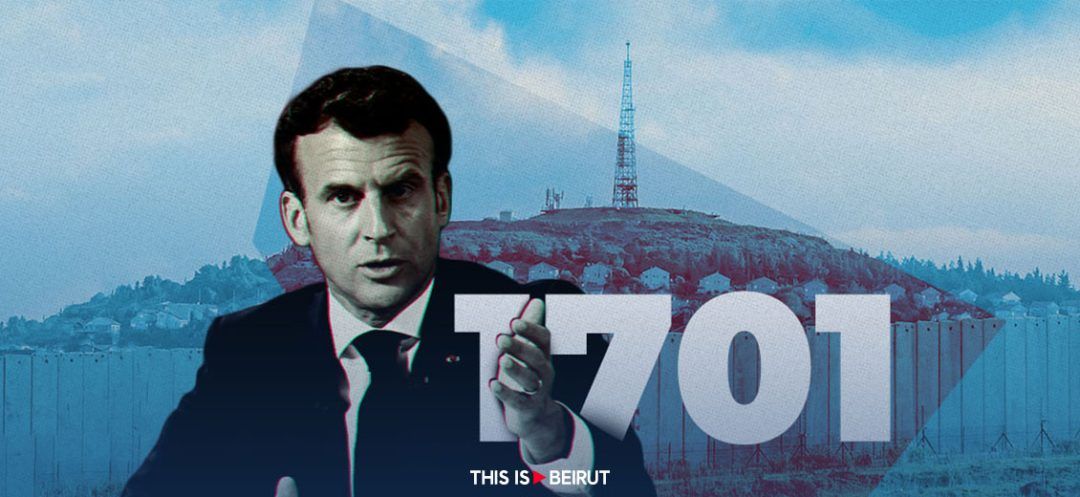- Home
- War in the Middle East
- Editorial – Southern Lebanon: Macron's Brief Reference to Resolution 1701

During his initial press briefing for the year 2024, French President Emmanuel Macron subtly addressed Lebanon, making a remark that went largely unnoticed. He urged a strict adherence to UN Security Council Resolution 1701, underscoring the importance of compliance “on both sides.”
Since the adoption of Resolution 1701, which ended the armed conflict in July 2006 between Israel and Hezbollah, this is the first time that a head of State or a senior Western official suggests the implementation of this resolution “on both sides.” This is because it can be seen from a thorough analysis of the UN text that all provisions and measures outlined in the resolution exclusively address Lebanon, particularly the state of affairs and security situation in the southern areas between the Litani River and the Israeli border. In a way, President Macron's short sentence aligns with Hezbollah’s argument — unsurprisingly echoed by the Mikati Cabinet — which shifts the equation by urging Israel to initially implement Resolution 1701…
For those unfamiliar (and those pretending to be), it would be beneficial to underscore the provisions outlined in the relevant UN resolution. This would help to better assess the significance and potential consequences of the French president's recent position.
Resolution 1701 underscores “the critical importance for the Lebanese government to extend its authority throughout the entire territory, aligning with the provisions of Resolutions 1559 (2004) and 1680 (2006), as well as the relevant clauses of the Taif Agreement. This aims to guarantee the full exercise of Lebanese sovereignty, prohibiting the presence of any weapons in any area without the consent of the Lebanese government. It also confined the exercise of authority solely to the government.”
The resolution also envisions “the establishment, between the Blue Line and the Litani River, of a zone free of all armed personnel, goods, and weapons other than those deployed by the Lebanese government and UNIFIL forces.” It further calls for the “full implementation of the relevant provisions of the Taif Agreements and Resolutions 1559 (2004) and 1680 (2006), which require the disarmament of all armed groups in Lebanon, in accordance with the Lebanese government’s decision of July 27, 2006, which specifies that only the Lebanese state is authorized to hold arms and exercise its authority in Lebanon.”
Since its adoption in 2006, Hezbollah has slowly, gradually and insidiously violated all the terms of this resolution by de facto reinstating its militia presence in the UNIFIL zone, clandestinely concealing various arms, ammunition and diverse military equipment. This became evident on October 8 when it reopened the southern front, just hours after the Hamas attack on Israel. Rapidly, the UNIFIL zone bore witness to the blatant emergence of Hezbollah militants and their fundamentalist Palestinian ally (so-called Hamas-Lebanon branch), spanning the entire border and adjacent villages. This was evidenced by the firmly entrenched illegal paramilitary infrastructure that was violating the provisions of Resolution 1701 which the pro-Iranian party has consistently sought to torpedo.
As the French president reasserts the need to enforce the terms of the Security Council resolution, the first implication is that Hezbollah promptly halts the broad-scale violations (past and recent) which have engulfed the entirety of South Lebanon since October 8. On the Israeli side, the cases of Ghajar village and Naqoura’s security point are still to be settled, whereas the issue of the Shebaa Farms is rather linked to a longstanding dispute with Syria.
When President Macron highlights the imperative of implementing Resolution 1701 “on both sides,” is he suggesting a mere settlement of these specific contentious points with Israel, or is he referring to a more comprehensive application along both sides of the Lebanese-Israeli border? Is he alluding to the project recently reported by certain local media — namely, the proposal of deploying American forces on the Israeli side of the border? This would occur simultaneously with the establishment of checkpoints manned by French units and the Lebanese army (LAF), potentially with presence of Hezbollah “observers,” if deemed necessary? This would imperatively imply an amendment to Resolution 1701, as the stipulations of the UN resolution specifically apply to Lebanese territory and do not encompass the Israeli side of the border in any manner.
Amendment means a new, hard-fought diplomatic battle and local political horse-trading, which would constitute a major diversion, for a long time to come, from the illegal paramilitary fait accompli once again imposed by Hezbollah in southern Lebanon. The ultimate aim of the pro-Iranian group is to trivialize its massive militia deployment in the UNIFIL zone, while awaiting the resolution of the regional tug-of-war sparked by the October 7 attack...
Read more




Comments